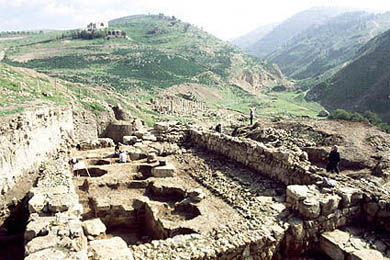2 Samuel 23:1-7
It seems somehow fitting that we end the Christian year with the "last words" (dibrey ... ha'acharoniym) of David. If we begin the reading just a verse earlier (2 Samuel 22:51), we also clearly pick up the theme of Christ (meshiycho) the King (malko). God is a tower of salvation for his "king," one who shows steadfast mercy (chesed, loving kindness, covenant loyalty) to his "anointed one." This statement of fact is born out by what follows. David is Israel's quintessential messiah, or anointed king. Now, at the end of his life, the question is whether his last words will bear witness to the truth of the statement about God's faithfulness in 22:51.
(Image Source, http://www.astarte.com.au/assets/images/sketch.jpg)
(Image Source, http://www.astarte.com.au/assets/images/Temple2003.JPG)
The LBA "migdol temple" at Pella provides a glimpse of the concrete "tower" of protection provided by the LORD to his anointed, David. (See 1 Samuel 21:1-8, etc.)
David's "last words" are uttered more as a prophet's oracle (ne'um, or like the Wisdom speeches in the Book of Job) than as a king's command. And it is clear that the power of these words is derivative. David is simply "Jesse's son," who has been raised up, anointed, and loved by Israel's God. The words David speaks are not originally his; they are breathed by the LORD (ruach YHWH) and placed like food on David's tongue. David is merely the chosen and anointed messenger, a singer of divine songs, if you will.
(Image Source, http://iamyouasheisme.files.wordpress.com/2008/11/eat_the_book.jpg)
The Spirit of the LORD who speaks through David's lips here (23:2) is not a stranger to the leaders of Israel. The Spirit came upon Othniel and Jephthah, on Sampson and even upon Saul, who was David's predecessor. But none of them was so thoroughly marked by the Spirit for kingship as David. David was Israel's king and anointed one par excellence.
(Dura Europos, Syria. Source: Gill/Gillerman slide collection. Image Source, http://upload.wikimedia.org/wikipedia/commons/d/d4/Samuel_e_david.jpg)
1 Samuel 16:13, "Then Samuel took the horn of oil, and anointed him in the presence of his brothers; and the spirit of the LORD came mightily upon David from that day forward. Samuel then set out and went to Ramah." (NRSV)
Even for kings there is a higher authority to whom they are accountable. There is a right way and a wrong way to rule. Those who rule in accord with universal human rights (ba'adam tsaddiyq) and with reverence toward God (yir'at 'elohiym) are gladly received because of the blessing they bring to their subjects. (23:3)
(Image Source, http://cache.virtualtourist.com/2318769-Morning_light-Walpole.jpg)
Such kings are like the morning light; their advancing presence clears away fear and darkness. Their presence means a day without clouds overhead, a day in which the morning mist glistens on the grass as a brilliantly sparkling display of God's blessing. The morning light allows the dew to linger a while. A morning sun warms but does not scorch. It is a welcome ray that drives away the chill of night. (23:4)
David asks, rhetorically, "Is my house [= my royal family; see II Samuel 7:11-12] not thus with God?" The answer he seeks is "Yes! Of course it is! Long live King David!" And David lines up evidence to support his claim of royal benevolence:
- God has made an everlasting covenant (beriyt `olam, II Samuel 7) with David and with his descendants. (Would God do that, if David had not been a good king?)
- God has kept things orderly and rule-y while David has been on the throne. (Despite attempts, there has not been a coup d'état. David has reigned a good long time.)
- God has (or will) prosper David's help (salvation) and desire (wants).
(23:5)
A worthless [king], on the other hand, is as welcome as a thorn. (Judges 9:7-15)
(Image Source, http://www.hubbo.com/images/2002-05-22/thorny-shrub-close.jpg)
No one wants to get close. No one wants to keep them. (Or their children who come to the throne after them.) Everyone throws them away, because they cannot be held in the hand without getting hurt. (23:6)

(Image Source, https://blogger.googleusercontent.com/img/b/R29vZ2xl/AVvXsEg0_xxCqcgkiGGyQ7v_w2Revxo1NqETKBle-hZ9ox8OKA8O4T6SaZbhe_c0YPuL5_A0QknyALwUQJuO29Y4Oiq5o6MgcSH7XOAwEpBLkzVxT60lOaU0ABezidCpniDDufa3ReS100Jj2ptI/s1600/thorns.jpg and http://www.rosegardeninghelper.com/wp-content/uploads/2009/09/3104TSX418L._SS400_.jpg)
To touch them at all, one uses metal tools, military tools, that can be manipulated from a distance. (23:7)
(Image Source, http://i.ehow.com/images/GlobalPhoto/Articles/4592155/Prunerosebush_Full.jpg)
They are then burnt "on the spot" (bashebet, where they sit: i.e., on the throne).
(Image Source, http://oaksavannas.org/photos/brambles-burning-013.jpg)
David is surely the former rather than the latter sort of king. David has lived, after all, to give his "last words." He has not been deposed and there is every reason to think that his heir will sit on the throne of Israel. The only question is which heir and whether the heir will follow in David's path as a good king or become thorny. But perhaps David's last words protest too much. There were times when David's actions--and those of his heirs--had brought calamity on his subjects. (With Uriah and Bathsheba, for example, 2 Samuel 11 and 12.)
(Image Source, http://restorationupdates.com/advice-tips-and-hints-to-be-restored/repentance-is-absolutely-important/)
But overall the judgment of Scripture is that David was a good king, a good example for future kings, for "rulers" of all sorts (e.g., elders and pastors in churches), and a prophetic glance at what comes next.
Revelation 1:4b-8
The revelation of Jesus Christ makes as clear as can be, as clear as flesh-and-blood, who is the authority behind all earthly authorities, the king of all kings, the "ruler of the kings of the earth." There is a right way and a wrong way to rule. His is the right way. His rule produces for his subjects:
- Grace
- Peace
- Life (from the dead)
- Faithfulness (the equivalent of chesed, covenant loyalty)
- Love
- Freedom
We expect this of a good king, the very best king. We expect that his reign will be long. An eternal covenant or politic can only be maintained by a king (or royal family) who is and was and will be the beginning and the end, the alpha and the omega. What may come as a bigger surprise to us is that we all are his subjects. We are his kingdom. (1:6) We, like David, are his "last words" to the world, priests (more so now than prophets).
(Image Source, http://frmarkdwhite.files.wordpress.com/2009/02/crown.jpg)
The question is whether we, Christ's heirs (or co-heirs with Christ), will embrace our crown (3:11) and our calling, bringing grace, peace, life, faithfulness, love, and freedom to our world, so that he may be welcomed by all.
John 18:33-37
This scene hardly needs an introduction. Jesus stands in Pilate's headquarters, in front of Pilate's judgment seat (throne), a good ruler under arrest by tyrants. Pilate, an earthly "king," claims to stand outside Jesus' jurisdiction. ("I am not a Jew, am I?")
(Image Source, http://www.cts.edu/ImageLibrary/Images/story/pilate.jpg)
Pilate claims that Jesus' own subjects (your nation and your chief priests) have handed Jesus over to him. The implication seems to be that Jesus is a bad king, if he is indeed a king at all. But Jesus objects that his kingdom is not of this world, not from here. The venue for Jesus' trial--and vindication--is elsewhere. That where seems to be a place where kings embrace thorny subjects and undergo severe punishment so that those they rule may go free. Pilate, perhaps thinking that he has trapped Jesus, says "So you are a king?" Jesus does not answer directly. (Nothing new about that!) But he appeals to the primary attribute and calling of a good king, the ability to judge his subjects on objective (Truth) grounds. A good judge is just ('adam tsaddiyq) and has a great reverence toward (fears) God. Unlike David, whose jurisdiction is limited to Israel, Jesus' reign extends to all who recognize the truth of his "last words."






No comments:
Post a Comment
Pastor Greg appreciates your comments on this week's scriptures!